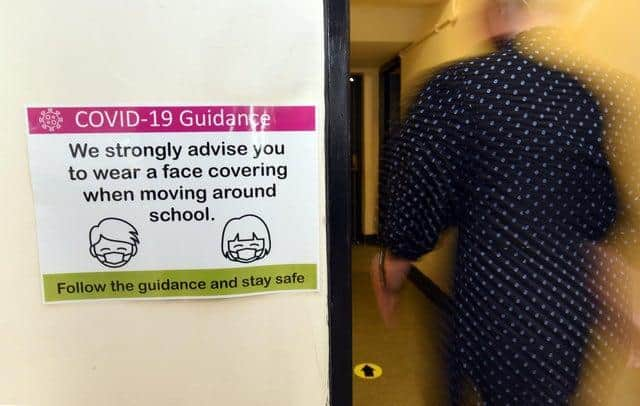What are the rules if your child is sent home from school in Chesterfield to self isolate
and live on Freeview channel 276
The amount of positive cases in schools across Derbyshire is growing daily, with pupils who have been in contact with infected individuals being sent home to self-isolate as a consequence.
This can include group ‘bubbles’, whole year groups, or, in some cases, even more.
When to self-isolate:


Advertisement
Hide AdAdvertisement
Hide AdIf your child has developed one of the following coronavirus symptoms, they should not attend school: a new continuous cough, has a high temperature, or has lost their sense of taste or smell.
The child should get a test through the Government website, or by calling 119.
The whole household, including the child showing symptoms, should self-isolate while waiting for a test.
The whole household should also self-isolate if the test comes back as positive.
Advertisement
Hide AdAdvertisement
Hide AdIf the NHS Test and Trace tells you that your child has been in ‘close contact’ with an infected individual, all members of your household do NOT need to self-isolate, unless they are a ‘close contact’ also.
Test and Trace guidance states: “If your test is positive, you must complete the remainder of your 10-day self-isolation.
"Anyone in your household must also complete self-isolation for 14 days from when you started having symptoms.
"If your test is negative, other household members no longer need to self-isolate.
Advertisement
Hide AdAdvertisement
Hide Ad"If you feel well and no longer have symptoms similar to coronavirus, you can stop self-isolating (unless you have been contacted separately by NHS Test and Trace as a contact of someone who has tested positive).”
Schools allow a child to return as soon as a test comes back negative.
If it is positive, or someone in you household tests positive, the child should only return after the 14 day isolation period.
What if someone from your child’s school has coronavirus?
Some schools are sending home group ‘bubbles’ if one individual has a positive test result, and others are sending home whole year groups – check your child’s school website for up-to-date information and guidance.
Advertisement
Hide AdAdvertisement
Hide AdA letter to parents from Hasland Hall School said: “If anyone in the school becomes unwell with a new, continuous cough or a high temperature, or has a loss of, or change in, their normal sense of taste or smell (anosmia), they will be sent home and parents will be advised to follow ‘stay at home: guidance for households with possible or confirmed coronavirus (COVID-19) infection’ which involves self isolation and booking a test.
“Anyone developing symptoms during the school day will be moved to an ‘isolation’ room until they can be collected from school.”
What to do when self-isolating:
Do not leave the house for any circumstance, including not to exercise, except to go in the garden.
Do not meet up with anyone from other households, including close family or friends, and do not let them in to your home.
Advertisement
Hide AdAdvertisement
Hide AdIf your whole household is self-isolating, do not go out to get food and medicine – order it online or by phone, or ask someone to bring it to your home.
Your child may be asked to complete homework or classwork online during the isolation period but this differs for the different schools in Chesterfield.
For more information on when and how to self-isolate, visit the NHS website.